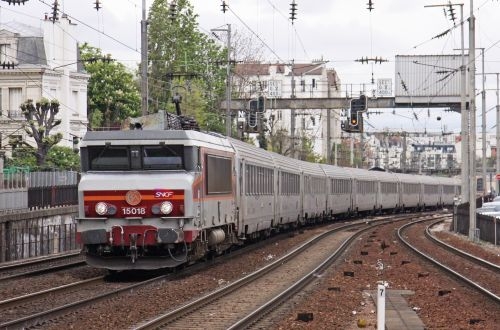The funding will support the revival of overnight passenger trains plus new freight services, particularly Autoroute Ferroviaires piggyback trains. These measures had been widely trailed following a speech by French president Mr Emmanuel Macron on July 14.
Infrastructure manager, SNCF Network, will receive €2.3bn for renewal of the main line network and €1.5bn for renewing bridges and structures, with an emphasis on improving network safety, punctuality and digital technology. Station facilities will be improved, especially for passengers with reduced mobility.
Regional government will be assisted in order to serve less populous areas better. SNCF Network will also receive funding for projects to save minor lines from closure. The regions will be encouraged to explore new economic models, including taking over full responsibility for local lines, as is already the case in the Grand Est and Centre-Val de Loire regions.
Night train revival
Overnight services from Paris to Tarbes/Hendaye and Nice will be revived following withdrawal in 2017. SNCF is currently modernising its remaining fleet of Corail couchette coaches for its surviving overnight trains from Paris to Briançon, Albi, Toulouse and Latour-de-Carol. Upgrades include installation of Wi-Fi, electricity sockets, refurbishment of toilets and air-conditioning, and improved sound insulation. The reinstatement of services will save 40 coaches from being scrapped.
The government stresses the importance of intermodal services and is supporting the launch of two piggyback trains - from Calais to Sète and Cherbourg to Bayonne - and an intermodal service taking fresh produce from Perpignan to Rungis in Paris, which may be extended to Barcelona and Antwerp in the future.
The government also repeated its commitment to the Lyon-Turin project, for which the main tunnelling contracts will be signed in 2021.
Of the €100bn stimulus plan, €30bn will go towards ‘ecological transition,’ of which €11bn is for transport. Public transport will receive €1.2bn in 2020-2022. This will go mainly to SNCF Network in order to extend Paris RER Line E to Mantes-la-Jolie and improve the common central section of RER lines B and D. The government also wants to give other cities RER-style networks and to double rail’s market share on these networks within 10 years. Light rail networks will also be developed further.
The government will allocate another €2bn - €7.2bn by 2030 - to develop hydrogen-based technology. Alstom is developing a hydrogen-powered version of its Régiolis bi-mode multiple unit following successful tests of the iLint in Germany. Support for industry will include money for companies developing hydrogen technologies but also batteries, such as Foresee Power, France. These initiatives are part of France’s objective of becoming carbon neutral by 2050.

